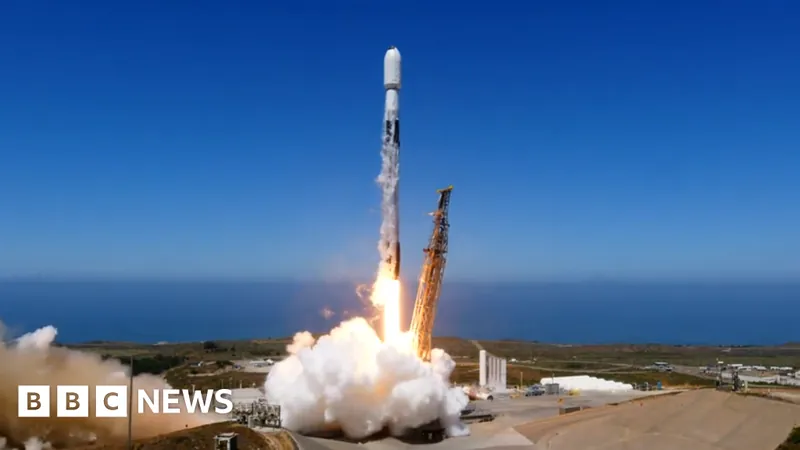
The African Satellite Revolution: Why Nations Are Racing to the Stars
2024-10-15
Author: Ling
Overview of Africa's Satellite Launches
On August 16, 2023, a historic moment unfolded as 116 satellites rocketed into orbit, with one among them marking a significant milestone for the African continent. The spacecraft, GaindeSAT-1A, developed in Senegal, symbolizes the nation's leap toward technological independence and self-sufficiency in space technology. This small CubeSat is designed to enhance earth observation and telecommunications services, echoing Senegal's President's vision of achieving 'technological sovereignty.'
Cost Reduction in Launches
The costs associated with satellite launches have plummeted dramatically over recent years. Kwaku Sumah, founder of Spacehubs Africa, emphasizes that this reduction has opened avenues for smaller nations to participate in the space race. To date, 17 African countries have successfully launched over 60 satellites into orbit. Recent examples include Djibouti and Zimbabwe, which have also celebrated the operationalization of their first satellites within the past year. With many more launches on the horizon, Africa’s space sector is on the verge of a boom.
Challenges of Local Launch Facilities
However, despite these advancements, Africa grapples with a significant absence of local space launch facilities. The reliance on foreign technology and expertise raises concerns about the continent's autonomy in outer space endeavors. Meanwhile, powerful nations are increasingly engaging with African countries, using emerging space programs as strategic tools to foster relationships and assert influence.
Importance of Sovereignty in Satellite Control
Mr. Sumah articulates the importance of African nations possessing their own satellites. By controlling their technology and improving access to critical satellite data, countries can address pressing challenges such as monitoring agricultural systems, mitigating climate-related risks like floods, and enhancing communication in remote areas.
Perceptions of Space Activities
Nevertheless, the perception of space activities as reserved for the elite persists. Jessie Ndaba, co-founder of Astrofica Technologies, highlights the need for space technology in addressing Africa’s direct challenges, such as resource management and climate change, rather than pursuing grand objectives like lunar or Martian missions.
Urgent Need for Monitoring Capabilities
As the continent faces an increasing threat from climate change, the need for monitoring capabilities is more urgent than ever. Sarah Kimani, from the Kenyan Meteorological Department, describes how satellites have proven indispensable in tracking and managing hazardous weather conditions, facilitating better preparedness and response strategies.
Investment in Meteorological Satellites
Kenya successfully launched its first operational earth observation satellite last year, but experts, including Kimani, argue that the nation stands to gain even more by investing in additional meteorological satellites. Countries within Africa are uniquely equipped to identify and tackle their specific needs, underscoring the idea that 'Only Africa understands her own needs.'
Dependence on Foreign Expertise
Despite the burgeoning interest in space, many African nations still depend heavily on foreign education and technological frameworks. Temidayo Oniosun, managing director of Space in Africa, points out the challenges facing returning graduates who often find a lack of infrastructure to apply their skills locally. Notably, Senegal's satellite was crafted by local technicians, yet it was developed with support from a French university and launched via a SpaceX rocket, illustrating the complexities of national pride versus global collaboration.
Global Powers in African Space Initiatives
Global powers—including the US, China, and Europe—have increasingly involved themselves in African space initiatives, further complicating the landscape. While these partnerships support technological growth, they can also be viewed as a means for influencing geopolitics on the continent.
Need for Updated Global Treaties
As Dr. Julie Klinger from the University of Delaware notes, the strategic interest in African space endeavors underscores a pressing need for updated global treaties to ensure a peaceful space environment. However, there are bright prospects as well.
Future Prospects of the African Space Industry
African nations have the potential to leverage launching from equatorial regions, which may require less fuel, making local space ports increasingly relevant for future missions.
Conclusion: A Transformative Journey Ahead
Amidst this dynamic backdrop, a surge in satellite development and launches from Africa is on the rise, with nearly 80 satellites currently in the pipeline. Mr. Oniosun remains optimistic, claiming that the future of the African space industry is indeed very bright. The continent is gearing up for a transformative journey, racing to establish its rightful place among the stars.



 Brasil (PT)
Brasil (PT)
 Canada (EN)
Canada (EN)
 Chile (ES)
Chile (ES)
 España (ES)
España (ES)
 France (FR)
France (FR)
 Hong Kong (EN)
Hong Kong (EN)
 Italia (IT)
Italia (IT)
 日本 (JA)
日本 (JA)
 Magyarország (HU)
Magyarország (HU)
 Norge (NO)
Norge (NO)
 Polska (PL)
Polska (PL)
 Schweiz (DE)
Schweiz (DE)
 Singapore (EN)
Singapore (EN)
 Sverige (SV)
Sverige (SV)
 Suomi (FI)
Suomi (FI)
 Türkiye (TR)
Türkiye (TR)